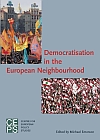Parties of Power as Roadblocks to Democracy: the Cases of Ukraine and Egypt
Parties of Power as Roadblocks to Democracy: the Cases of Ukraine and Egypt
Author(s): Madalena Resende, Hendrik Kraetzschmar
Subject(s): Governance, Government/Political systems, Politics and society
Published by: CEPS Centre for European Policy Studies
Keywords: Democracy in Ukraine; Democracy in Egypt;parties of power;
Summary/Abstract: Political parties are the backbone of any functioning representative democracy. They are the agents that compete in the political arena for public office by offering programmatic alternatives to voters. It is not surprising therefore that an analysis of countries that have failed todemocratise shows political parties suffering from a severe pathology that renders them weak institutions. In both the eastern and the southern neighbourhood of the EU, a type of party has emerged, the ‘party of power’ characterised by its dependence on the state, the absence of ideology and the linkage with specific sectoral groups. Examples of such parties can be found in Ukraine during the reign of President Kuchma and in present-day Egypt.
The ideological weakness of parties of power and their dependence on the state is both a symptom and a cause of the failure of democratic consolidation. Because they prevent the emergence of a multi-party system based on competing ideological-programmatic currents, these parties and their legacies should be seen as an important stumbling block in the transition towards and consolidation of democracy. This paper attempts a summary analysis of the phenomena, suggesting that an alternative model of party development is required in order for democracy to take hold in the eastern and southern neighbourhood of the EU.
Book: Democratisation in the European Neighbourhood
- Page Range: 153-167
- Page Count: 15
- Publication Year: 2005
- Language: English
- Content File-PDF

